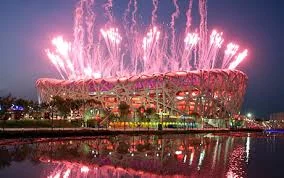Garbage and the Green Games
August 5, 2008
IN ONE of Beijing's southern suburbs - where a multitude of tenements, industrial units and gated apartment complexes have been built over the last two decades to accommodate the city's ceaseless growth - the government has been pleading with angry local residents to shut up.
A small group of concerned citizens were planning to meet at the weekend to discuss their latest moves in their efforts to sue the new Ministry of Environmental Protection, but government representatives - who have been doing their utmost to eliminate the negative over the next fortnight or so - told them to hold their tongues until the Olympic Games came to an end.
"The government said that we should show some understanding towards them, but equally, they should show understanding towards us," said Zhu Ping, the leader of this quiet campaign.
Wealthier and harder to please than ever before, China's middle classes are starting to get a feel for litigation. Living in an elegant new apartment block situated at a convenient distance from Beijing's notoriously congested city centre can never be enough to persuade them to stop and smell the roses, especially when it happens to have been built close to a massive waste disposal facility that processes the garbage of more than a million local citizens, thus stinking up the entire suburb.
Local citizens want the facility fixed, sequestrated or - the best option - relocated. Above all else, they want the government to do what they can to get rid of the stench.
"We've all become experts in waste and waste incineration as a result of this," another resident said.
Every night, the stink of putrefying waste drifts into their homes. During the day, in what another resident described as a parody of the Olympic flame - workers wield torches to ignite the methane leaking steadily out of the earth. By midnight, the site is unmanned and the stench spreads quickly across the southern suburbs.
"The authorities admitted that the problem covers a radius of about 3 kilometres and a population of about 100,000 people," said the resident.
With the government jittery in the run-up to the biggest international event in its history, the resident preferred not to disclose his name.
"Basically, 100,000 people are actually being woken up in the night by the smell, and there's nothing they can do about it," he said.
Beijing has been trying to beautify itself long before the Olympic Games were even considered. By now, they are well aware of the challenges. Once you've decided to move the unsightly smokestacks, factories and rubbish tips from the city's central districts, what do you do with them? The problem for Beijing is compounded by the fact that they are rapidly running out of room for the millions of new and increasingly prosperous residents all desperate to buy homes.
The landfill project was approved by the government and launched in 2006 as an "Olympic project." It handles the household waste of nearly a million residents in Beijing's huge Chaoyang district, which begins in the louche bar district of Sanlitun and extends south towards the outlying suburb of Tongzhou.
"This is not about compensation. Its about our health," said the resident, a respectable, middle-class citizen and member of the Chinese Communist Party. "We are not doing this to insult China or the Chinese government."
They are continuing to protest, aiming to take advantage of the growing environmental awareness of the Chinese authorities, but there are loopholes in the regulations.
"The environmental impact assessment law is pretty good, and it forces the government to take account of the opinions of ordinary people," said Zhu.
"But once those opinions have been collected, it doesn't matter whether 100% of people are against the project, it doesn't make any difference. This is the big loophole in the law."
It isn't even just the smell. While a number of other countries have rejected the idea of burning rubbish - Japan shut down 4,600 plants eight years ago - China is still going ahead with plans to fulfill what it describes as "the comprehensive utilization of resources." On this very site, the Beijing Jinzhou Group is in the process of building a massive furnace capable of burning as much as one seventh of the city's urban waste. Next to it will be a power plant fueled by 800 tons of garbage every day. It will be the biggest project of its kind in the country.
The Beijing Gao'antun Domestic Waste Incineration Project was approved in 1997 after the then-mayor, Jia Qinglin, called upon the city to resolve its growing waste problems. For various reasons - including the withdrawal of investors - it wasn't launched until 2002, when the Jinzhou Group finally stepped into the breach.
China aims to convert 30% of its rubbish into electricity by 2030, up from less than 2% at the end of 2005, according to plans released by the Ministry of Construction.
And it sounds a good idea, but the residents are now complaining about the use of cheap and "backward" technology and fretting over the possibility that the incineration of several thousand tons of unsorted plastics and chemicals every day will spew dioxins and other lethal carcinogens into the community's airspace. They are livid that the projects are being treated as part of the environmentally-friendly plans of a government increasingly keen to prove its green credentials and draw in foreign investment and equipment by doing so.
In theory, the toxins are fed back into the incinerator and broken down into safer compounds, but residents complain that the technologies involved are not sophisticated enough - and they also say that the government inspectors are insufficiently punctilious to make the project safe.
Last June, thousands of protesters gathered outside the offices of the environmental watchdog to oppose the construction of a waste-to-energy plant being built near Beijing's Zhongguancun software park. They remain sceptical of government claims that the equipment is safe and believe that local air and water supplies are being contaminated.
"The inspectors come to have a look when the project hasn't even been finished, and of course they find that the pollution levels are acceptable," said the resident. "On paper, the project has passed all inspections. But our neighborhood still stinks."
"We complain, but we don't have the worst of it," he said.
"Some of the poor people from the city have seen their houses demolished and they are now being relocated to new apartment blocks right on the edge of this landfill. This is immoral, and it can't be good for their health."
There are, according to official figures, about 7 billion tons of waste buried around China's major cities, and as the country's urbanization plans gather pace, the problem is getting increasingly difficult to handle. As the borders expand to accommodate rising populations and the growing demand for space, city planners are now pushing up against the circles of junk that has long been interred around the capital.
China's landfills have already attracted millions of dollars in investment from the likes of Impreglia of Italy, France's Veolia and the Covanta Energy Group of the US. They have also become one of the key attractions for the "clean development mechanism", the UN carbon trading facility.
Whether the technology is safe or not, the residents are still unconvinced by government promises to get rid of the stink, and they are becoming increasingly adept at using green regulations to their advantage. Their efforts might have been put temporarily on hold as a result of the Olympic Games, but they are still angry, and their campaigning will continue.
Human rights have been one of the key issues in the build-up to the Games. It was always parochial to argue - as some have - that ideas like democracy or free speech were somehow derived from the specificities of western economic development or the very contingent existence of influential philosophers like Locke or Kant. To say that China is still dominated by a sort of of residual Confucianist-Leninism and is therefore not concerned about the individual is an insult to the thousands of people locked up in jails for criticizing the government, and to the millions now speaking out in order to force the state to behave fairly.
Thousands of local people have already been doing what they can - slowly and incrementally - to push and reshape Chinese policies in ways that could better protect their interests. Progress has been unspectacular but steady. The middle class campaigners are not planning to storm the Great Hall of the People, unfurl banners in front of the Gate of Heavenly Peace or proclaim new political orders. Their concerns are local, individualistic. To express them, they are hiring lawyers and scrutinizing the small print of government legislation.
Stability is always the fundamental concern of the government, and as far as political reform is concerned, they have normally erred on the side of stagnation. The Olympics has been a massive distraction, an anomaly that has led to increasing levels of vigilance and control on the part of the state. Afterwards, one imagines that it will be the piecemeal, bourgeois not-in-my-backyard demands of Mr. Zhu and his co-campaigners that will start to reverberate the most.






